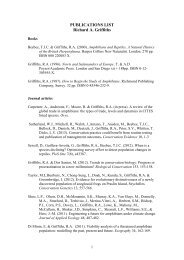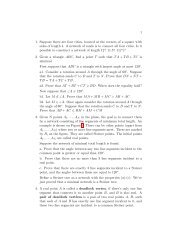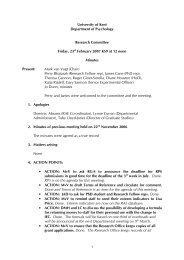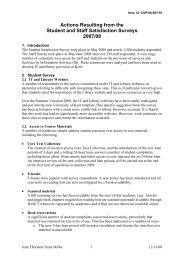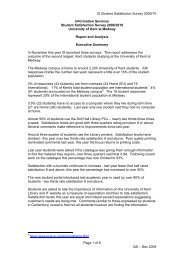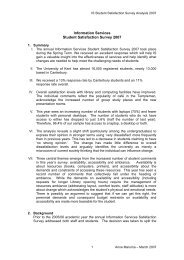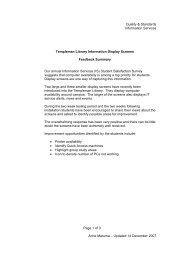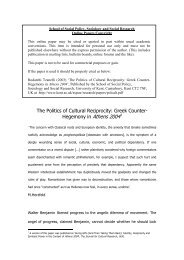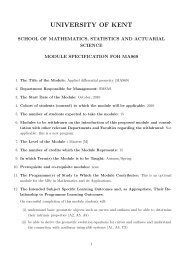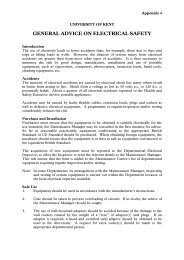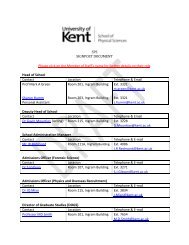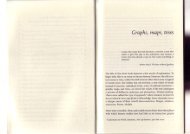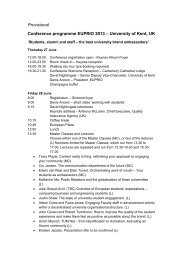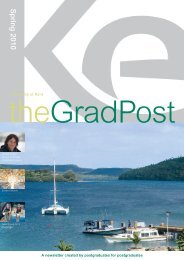The Million Pound Donors Report 2012 - University of Kent
The Million Pound Donors Report 2012 - University of Kent
The Million Pound Donors Report 2012 - University of Kent
Create successful ePaper yourself
Turn your PDF publications into a flip-book with our unique Google optimized e-Paper software.
DONOR CASE STUDY:<br />
FRAN PERRIN<br />
Fran Perrin is founder and trustee, together with her<br />
husband William, <strong>of</strong> the Indigo Trust, which is one <strong>of</strong><br />
<strong>The</strong> Sainsbury Family Charitable Trusts. <strong>The</strong> Trust<br />
has assets <strong>of</strong> over £7 million and funds technologydriven<br />
projects to bring about social change, largely in<br />
African countries, by focusing mainly on innovation,<br />
transparency and citizen empowerment.<br />
“Very unusually, I grew up with an early awareness <strong>of</strong><br />
philanthropy as the wider family has eighteen charitable<br />
trusts and foundations, so from a young age I had a sense <strong>of</strong><br />
the importance <strong>of</strong> giving. As a teenager I wasn’t actively<br />
involved in the family foundations, but I was aware <strong>of</strong> my<br />
parents’ values and that had a huge impact. It was always<br />
clear to me that giving was a responsibility.<br />
I was just starting at <strong>University</strong> when I set up the Indigo<br />
Trust so I didn’t have a very clear focus or a strategy on how<br />
I wanted to make an impact. Getting Indigo up and<br />
running quickly was greatly helped by the excellent<br />
administrative <strong>of</strong>fice shared by all the Sainsbury family<br />
foundations. This gave me access to a superb range <strong>of</strong><br />
pr<strong>of</strong>essionals with skills in policy, research, grant making<br />
and the technicalities <strong>of</strong> charity law. As I was funding<br />
Indigo myself I did not have to fundraise, but realised I<br />
needed to understand the grantee perspective. So I<br />
volunteered with several charities who have to fight a<br />
constant fundraising battle - it is very important that<br />
philanthropists see the other side <strong>of</strong> grant making.<br />
From the start I was attracted to issues and causes that find<br />
it harder to produce glossy appeals – I’ve always been<br />
attracted to things where it’s harder to raise money, or for<br />
core budget items. <strong>The</strong> temptation for funders can be just<br />
to fund the interesting project - but if you trust the charity<br />
and their approach then building capacity and<br />
sustainability in that charity through a developing<br />
relationship can have huge long term benefits.<br />
Initially I was quite reactive - there are so many problems<br />
and extraordinary charities tackling them that I struggled<br />
to find focus and just responded to proposals that we<br />
received. I started to become frustrated that my approach<br />
was too scattergun and I struggled to predict which grants<br />
would be successful and why. I realised that in my<br />
pr<strong>of</strong>essional life, working in the civil service and in policy<br />
think tanks I’d always trained or studied for every job I’d<br />
ever done. That’s what I needed to do to be a strategic<br />
philanthropist. I wanted it to be more than just a hobby, so<br />
I decided to stop making grants (though we honoured all<br />
our existing commitments) and not to continue until I had<br />
the MIllIon PoUnd donors rePort <strong>2012</strong><br />
a clear strategy. It’s taken me time to learn to be more<br />
strategic and to focus on one sector, but now I can be more<br />
<strong>of</strong> an informed donor and hopefully have a deeper impact.<br />
As a result <strong>of</strong> attending <strong>The</strong> Philanthropy Workshop, run<br />
by the Institute for Philanthropy, I realised that what I<br />
really care about - and what I’m really interested in - is the<br />
use <strong>of</strong> information technology for transparency and social<br />
change. I was inspired by reading the mission statements<br />
<strong>of</strong> major donors like the Omidyar network and that<br />
informed my own emerging strategy.<br />
I didn’t want to repeat past mistakes, so I began with a<br />
two-year strategy making lots <strong>of</strong> micro-grants in different<br />
areas and fields, before evaluating what worked best. I<br />
wanted to find out things like: were we more effective in<br />
Kenya than in Ghana? Was core funding or project funding<br />
more effective? What had the most impact? And what was<br />
the most satisfying? – And I do think that last point is<br />
important for donors. We’re three-quarters <strong>of</strong> the way<br />
through that process now, and we’re still giving fairly small<br />
grants. Our average grant size is £10,000, with an annual<br />
budget <strong>of</strong> £750,000, so we’re working with a lot <strong>of</strong><br />
organisations! We’re starting to get a really good sense <strong>of</strong><br />
where we can have the most impact, who we will fund at a<br />
higher level and who we might recommend on to other<br />
funders.<br />
It feels so exciting to be finally making the right grants,<br />
particularly because we’re proving that the strategy works<br />
and that funding at this level is still valuable. We work with<br />
a lot <strong>of</strong> very small organisations so this can be a very big bit<br />
<strong>of</strong> their budget. We also had a sense about technology and<br />
innovation in Africa, that it was worth fostering a tech-y,<br />
grassroots industry that would have a lot <strong>of</strong> positive<br />
<strong>of</strong>fshoots. For example, we fund innovation hubs in Kenya,<br />
nigeria and Uganda, which support and mentor a lot <strong>of</strong><br />
transparency and anti-corruption projects. We thought this<br />
would work, though we knew it was quite high-risk, but the<br />
evidence suggests that it is working very well, and that’s<br />
very satisfying.<br />
For me, philanthropy is an opportunity to support social<br />
change and innovation. I’m always very clear that the ideas<br />
and the change don’t come from me - I’m just fortunate<br />
enough to support some extraordinary individuals and<br />
projects. At the Indigo Trust we believe that if people are<br />
supported to access, create and share information then<br />
they will be able to make a positive change to their lives<br />
and communities.<br />
21



